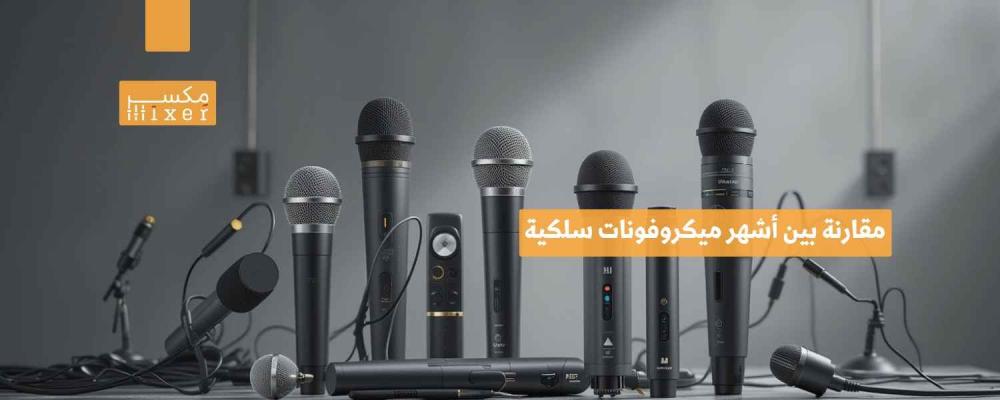Comparison of the most popular wired microphones for mosques and the best options for 2025
Introduction to the article
A wired microphone is one of the most important audio equipment in mosques, playing a key role in clearly transmitting the imam's voice during prayers and sermons. Choosing the ideal dynamic microphone depends on several factors, such as sound sensitivity, isolation quality, sound pickup range, and stability during use .
In this article, we'll compare the best sensitive microphones for mosques in 2025 , detailing their specifications, uses, and how to choose the right microphone to ensure a clear, distortion-free audio experience.
Main components of a wired microphone
✔️ Diaphragm: The part responsible for converting sound waves into electrical signals .
✔️ Capsule: Contains the magnet and coil that determine the sound quality and sensitivity .
✔️ Noise Filter: Helps reduce noise and interference from the outside environment.
✔️ Cable: It transmits the audio signal from the microphone to the speaker, and it must be durable and resistant to electrical interference .
✔️ Microphone body: It should preferably be made of durable metal or high-quality plastic to ensure durability.
Types of wired microphones for mosques
🔹 Dynamic Microphone:
✔️ It is characterized by high durability , and is most commonly used in mosques due to its ability to withstand high pressure and capture strong sound .
✔️ Not easily affected by ambient noise.
✔️ Suitable for large mosques.
🔹 Condenser Microphone:
✔️ It has high sound sensitivity , making it ideal for small mosques or enclosed spaces.
✔️ Requires additional power source (Phantom Power).
✔️ Captures the finest audio details, but may be more susceptible to external noise .
🔹 Cardioid Microphone:
✔️ Picks up sound from the front only , reducing distortion and side noise .
✔️ Ideal for delivering sermons and lectures in mosques .
Uses of wired microphones in mosques
✔️ Clearly transmit the imam’s voice during prayer and sermons .
✔️ Use it in religious lessons and lectures inside the mosque .
✔️ Improve the Azan experience by connecting it to the central sound system .
✔️ Reducing sound interference inside the mosque to obtain a pure and perfect sound .
The importance of choosing a high-quality microphone for mosques
🔹 Achieving purity and clarity of voice during prayer and sermons.
🔹 Avoid noise and echo , especially in large mosques.
🔹 Ability to withstand repeated use without affecting quality.
🔹 Reduce external noise for clear, interference-free sound.
Tips for Choosing the Right Wired Microphone
✔️ Determine the type of microphone you need based on the mosque space and different uses.
✔️ Choose a microphone with appropriate sensitivity to ensure the Imam's voice is clear and without distortion.
✔️ Ensure the quality of the cable and connections to avoid signal loss or electrical interference.
✔️ Test the microphone before purchasing to ensure it is compatible with the mosque's sound system.
✔️ Choose a microphone from a trusted brand to ensure performance and durability.
The Best Wired Microphones for Mosques in 2025
✅ Taiwanese wired pickup microphone JDS LS-101
✔️ Distinctive audio performance with high sensitivity.
✔️ Ideal for use in mosques, shops and conferences.
✅ TG V70S Wired Sensitive Microphone - Made in Germany
✔️ Superior sound quality with advanced noise isolation.
✔️ Ideal for imams and preachers thanks to its professional design.
✅ Motiv MT-6.3 G Professional Dynamic Wired Microphone
✔️ Provides clear and consistent sound.
✔️ Durable design for continuous use in mosques.
Related articles from Mixersa Store
📌 🔊 A comprehensive guide to choosing the types of loudspeakers for mosques
📌 🕌 A comprehensive guide to choosing the ideal prayer time clock
📌 🚿 Best Bissell Carpet Cleaner of 2025
📌 Article conclusion
A wired microphone is one of the most important factors affecting the sound quality inside a mosque , ensuring that the imam's voice is clearly heard by worshippers, whether inside the mosque or via external speakers. Choosing the right microphone depends on several factors, including sound sensitivity, noise reduction, build quality, and compatibility with audio systems .

